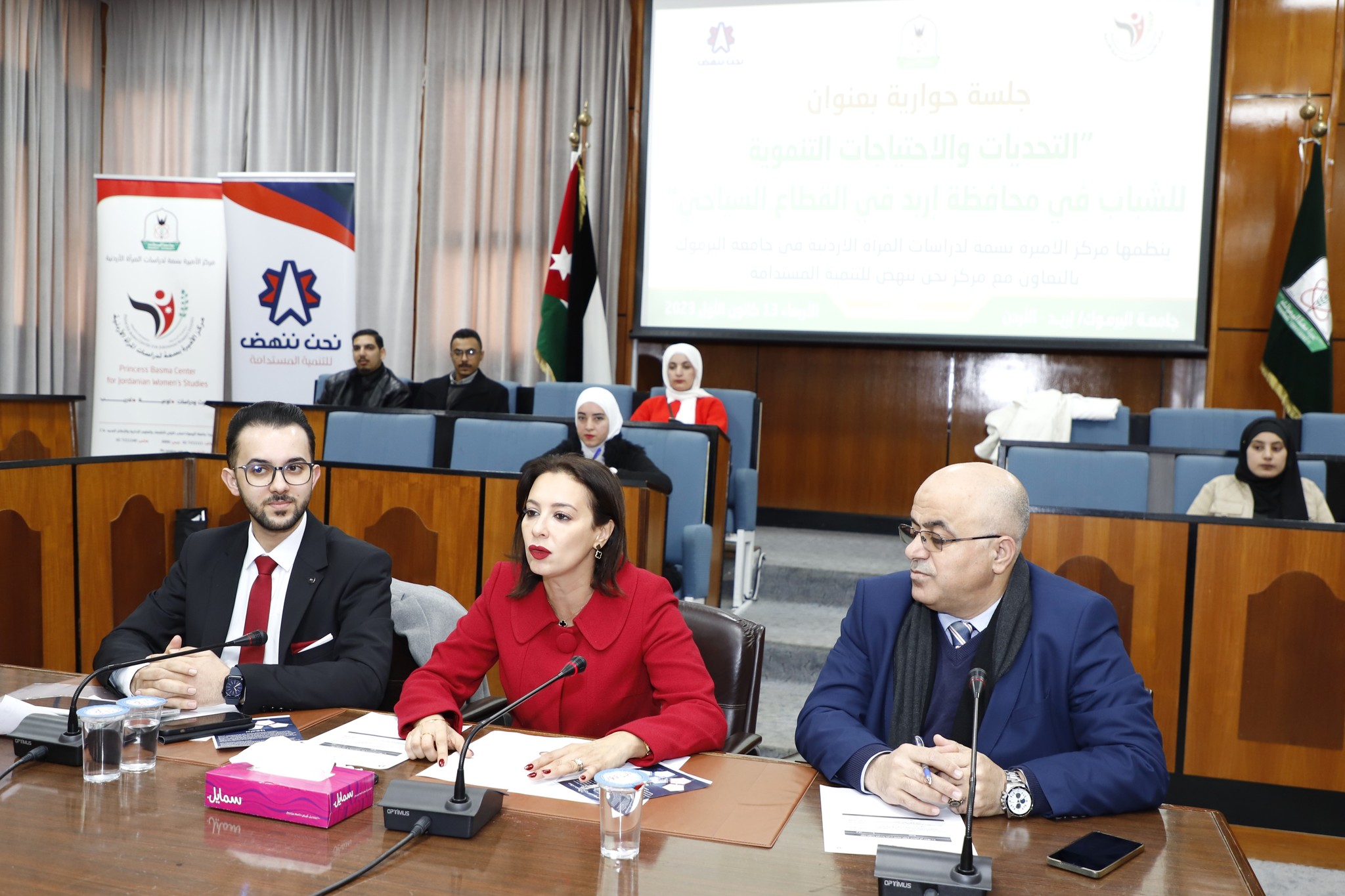

The Princess Basma Center for Jordanian Women’s Studies, in collaboration with the We Rise Center for Sustainable Development and the College of Tourism and Hotels, hosted a dialogue session titled "Challenges and developmental requirements of youth in Irbid Governorate in the tourism sector." The session was attended by Dr. Batoul Al-Muhaisen, the Director of the Center; Dr. Akram Rawashdeh, the Dean of the College of Tourism and Hotels; and Mr. Amer Abu Dalu, the Director General of the We Rise Center.
At the start of the session, Al-Muhaisen greeted the participants at the Yarmouk University of Science and Knowledge, which is committed to contributing to national development. He emphasized that since its inception, Yarmouk University has been a prominent center of cultural and scientific excellence, and its students and alumni serve as a source of pride for us.
In today's session, she emphasized that selecting the tourism axis is a continuation of the royal endeavors to enhance the tourism sector and equip it with necessary resources. She highlighted that "Yarmouk”, and its College of Tourism and Hotels are at the forefront of innovative work in this domain, particularly due to the college's inclusion of proficient scientific expertise and unwavering dedication to advancing and serving this crucial sector.
According to Al-Muhaisen, the youth are a valuable resource for the nation's future success. He emphasizes the importance of engaging students in awareness sessions and collaborating with development institutions that organize impactful initiatives and activities. The goal is to identify challenges and problems and develop practical plans to address them, leading to a series of achievements.
Al-Rawashdeh emphasized the need for enhancing and promoting the participation of women in the tourism industry. He pointed out that working in tourism is not exclusive to any one group or gender.
He emphasized the importance of empowering young individuals in different domains, and it is our responsibility to equip them with the necessary knowledge and abilities to fulfill their role in the development of our nation. He also emphasized the importance that His Majesty King Abdullah II places on the tourism sector, which contributes 14% of the country's gross domestic product.
Al-Rawashdeh emphasized the need for consolidating efforts to promote the city of Irbid as a prominent destination on the Jordanian tourism landscape, considering its unique tourist environment abundant with attractions. The area includes five towns from the Roman Decapolis and around 500 villages, thereby promoting rural tourism in the region.
Abu Dalu stated that this session's organization aligns with the We Rise Center for Sustainable Development's vision of fostering collaboration and partnership with government and official entities. In 2018, patriotic and socially conscious young individuals established the We Rise Center for Sustainable Development, a civil society institution. Its primary objective is to increase youth engagement in political and economic spheres while also empowering them to shape the future through skill development.
The user expressed gratitude for the productive collaboration between Yarmouk University and civil society organizations in Irbid Governorate. They also highlighted the university's commitment to assisting students and offering them valuable experiences and expertise. The user mentioned that the current session is part of the Youth Council 21 project, which is an elected youth council in Irbid Governorate. The project aims to replicate the functions of elected councils and engage young individuals in local policy development.
He stated that the Youth Council 21 is currently working on three initiatives: the "Youth and Municipalities" initiative, the "Guide to Needs" initiative, and the "Lafta" initiative. The "Lafta" initiative aims to address the tourism challenges in the Koura and Northern Jordan Valley districts. This session was organized as part of the "Lafta" initiative's activities.
The session focused on the "Lafta" initiative, which aims to develop tourism in Tabaqat Fahal, Barqash, and Wadi Al-Rayyan. The presentation discussed the challenges faced in these areas, such as disputed basins, the absence of tourist offices, inadequate basic services and infrastructure, and limited media coverage. Additionally, the session addressed the issues faced by local residents and the desired outcomes of the initiative.
After the session ended, the participants engaged in a thorough discussion led by Dr. Tariq Al-Nasser, the Deputy Director of the Princess Basma Center for Jordanian Women’s Studies. The discussion revolved around various topics, including the current state of the tourism sector in the Northern Jordan Valley and Koura Districts, the key tourism opportunities and attractions in those areas, and the significant needs and challenges that they face.
The Ministry of Tourism and Antiquities, together with the Tourism Promotion Authority, assessed tourist attractions in those regions, explored strategies to boost domestic tourism in those areas, and analyzed young people's involvement in the development of tourism in their respective regions.






